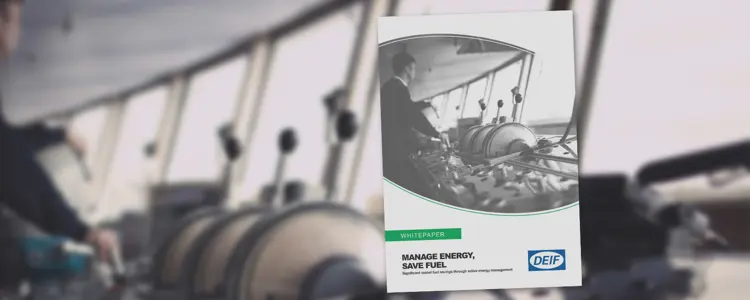Save money and time with maritime type approval
You’re a system integrator, panel builder, or electronics expert. You’re building or assembling an electronic system, like an engine room switchboard, a bridge instrument panel, or a shore connection system, on a new or upgraded ship. And one of the many jobs you need to do is to procure the necessary devices.
We’ll help you out with a pro tip: When you’re sourcing controllers, relays, or other devices, choose products and software that come with type approval according to classification society regulations. The reason? You can save money, effort, and time in the long run. We’ll explain why in a minute, and we’ll also explain what type approval actually covers in the context of maritime electronics. First, let’s take a quick look at why type approvals exist at all.

Ensuring safe operation of commercial ships
Most vessels in commercial use, from passenger ferries to LNG tankers, need to comply with regulations laid down by classification societies (often called class societies, or simply classes). These regulations ensure that ships across the world satisfy regulatory, technical, safety, and environmental requirements.
In other words, class regulations, and the type approvals that are based on them, help keep people and cargoes safe because they ensure that ships are safe and reliable – if the crews operate them correctly, of course. The regulations ensure that crews can count on critical systems to keep working in an emergency. Just imagine if a technical glitch takes out the power management system because the controllers weren’t suitable for maritime use and the ship is a hundred miles from shore. With type approved devices, this is far less likely to happen.
Approval: not the same thing as compliance
So, type approvals are necessary, and you really should source devices and software that are type approved from the factory – not just “compliant” with class regulations.
The reason is simple: If you buy products that are not type approved, but only compliant, the responsibility for securing type approval rests with you as system integrator … and trust us: This takes time, and it’s not cheap.
There are two more good reasons: You usually have little guarantee that the class society will actually approve a given product, even if the manufacturer stated that it complies with regulations. And you may find that your solutions will only be accepted for projects if the products you use are type approved: Not all clients have the time and patience to wait until the painstaking type approval process has been successfully completed.
Factory approvals save time, effort, and money
By contrast, if you purchase devices and software that come with type approval certificates, you can prove their compliance when class agents audit, inspect, or survey the ship. As a consequence, agents will (usually) not ask you for additional detailed product documentation, and they will focus on testing the entire system, not its individual components. This shortens the approval process for the system and the entire ship, and you save time, effort, and money.
And yes, you’re right – buying factory type approved devices will typically cost you more than buying non-type approved gear – but this is really one of those cases where you save in the long run!
(A quick note: Remember to purchase devices that have been type approved by the class society that will also inspect the ship. There are several class societies, and they do the same thing: approve ships and equipment according to rules based on a unified requirement (UR) from the International Association of Classification Societies (IACS). But every class society has slightly different interpretations of that unified requirement. If your ship is to be inspected by Lloyds Register, for example, you should therefore fit Lloyds Register approved products on it – not, for example, equipment that has been approved by Bureau Veritas or DNV but not Lloyds.)

Verified to work at sea
What exactly does maritime type approval mean when we’re talking electronic devices and software? It means that the products will keep working in conditions that would scare the electrons out of systems designed for use on dry land. Maritime devices and software will keep working in extreme temperatures and highly saline air. They can handle constant vibrations and occasional bumps. They tolerate voltage fluctuations. Even when devices are splashed with water, they will just keep going.
You may have noticed that we talk about both hardware and software. Yes, software also needs to be type approved; we’ve seen examples of designers who purchased hardware that was type approved but where the software was not, or where the software needed reapproval after addition of some critical functions.
This is an important point because many of the important functions of modern maritime electronic systems are based on software, not just hardware. The easiest way of ensuring software type approval is to source devices from a vendor that has taken the necessary steps to get the software approved along with the hardware – and has taken steps to ensure that software updates released through the lifetime of the controller to fix bugs and add new features are also class approved.
Type approved software helps ensure that crews can count on the device in an increasingly electronic maritime world: A type approved maritime genset controller, for example, can resist electromagnetic disturbances from nearby devices – and it offers strong resistance against cyberattacks.
Cybersecurity also included
Indeed, cybersecurity is now so important that it has become an integral part of type approvals. The IACS has defined two URs that must be satisfied for many ship types: UR E26 which covers the secure integration of both operational technology (OT) and information technology (IT) into the vessel’s network, and UR E27 which aims to ensure that system integrity is secured and hardened by third-party equipment suppliers.
In an age where cybercrime at sea is a rising problem, efficient cybersecurity on board is mandatory. By sourcing devices and software that have been type approved at the factory, you can rest assured that you will comply with these critical regulations, too.
Want to know more? Talk to us
To conclude: For most commercial ships, type approval is necessary. It helps keep people and cargoes safe by ensuring that the ships carrying them satisfy stringent requirements. And by sourcing devices and software that have been type approved at the factory, you can save a lot of time, money, and effort when building ship systems that meet these demands.
Need to know more? Contact us. DEIF devices and software for maritime applications come with a long list of type approvals from major classification societies, and we know what it takes to build resilient control solutions. Let’s talk about how we can help you do the same whilst saving time, effort, and money.
Read our guide for commercial vessels
-

Contact us to discuss your options
- 90 years of energy pioneering
- Manufactured at the highest standards
- Superior quality
- Unmatched service and support
- Made in Denmark




